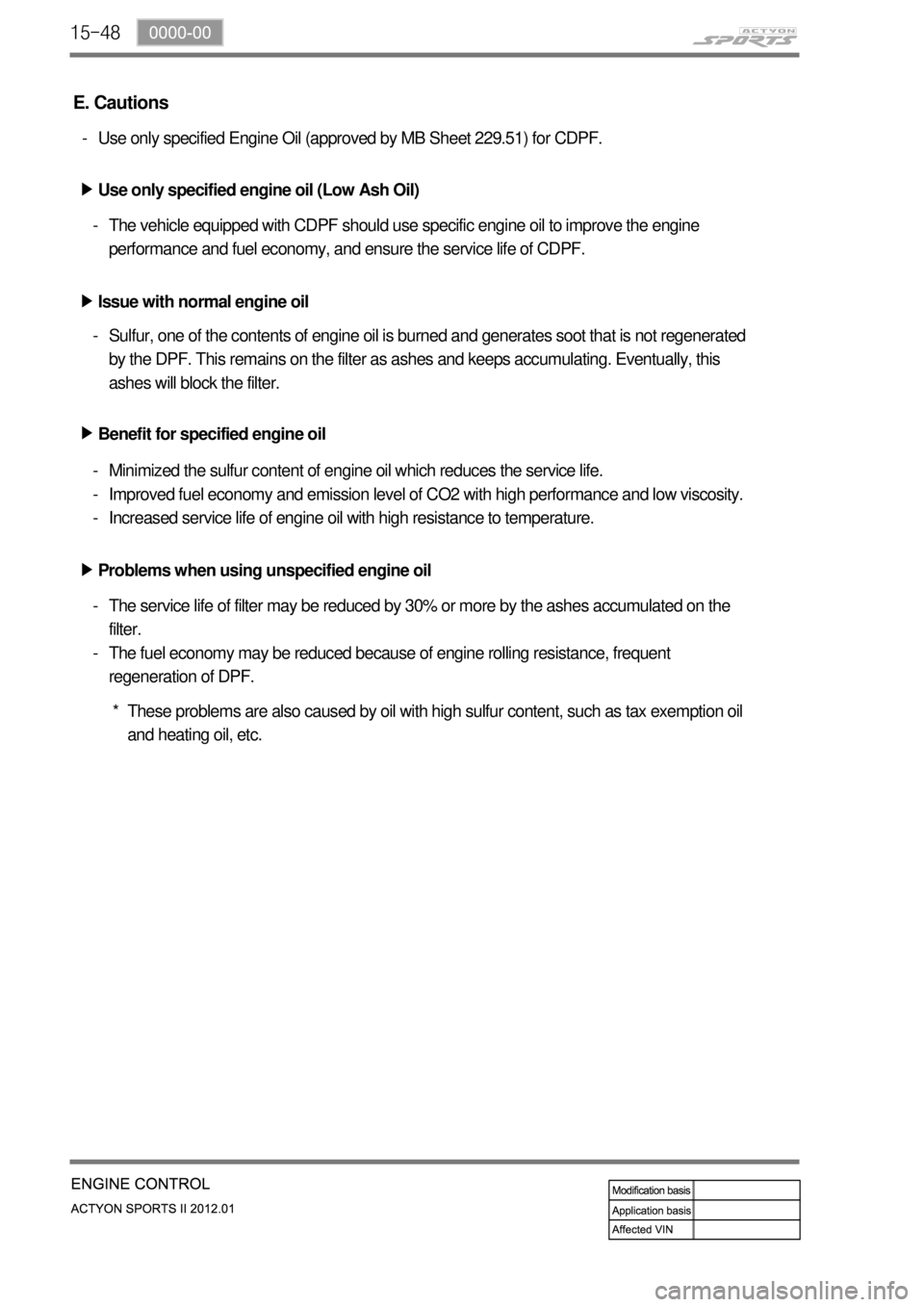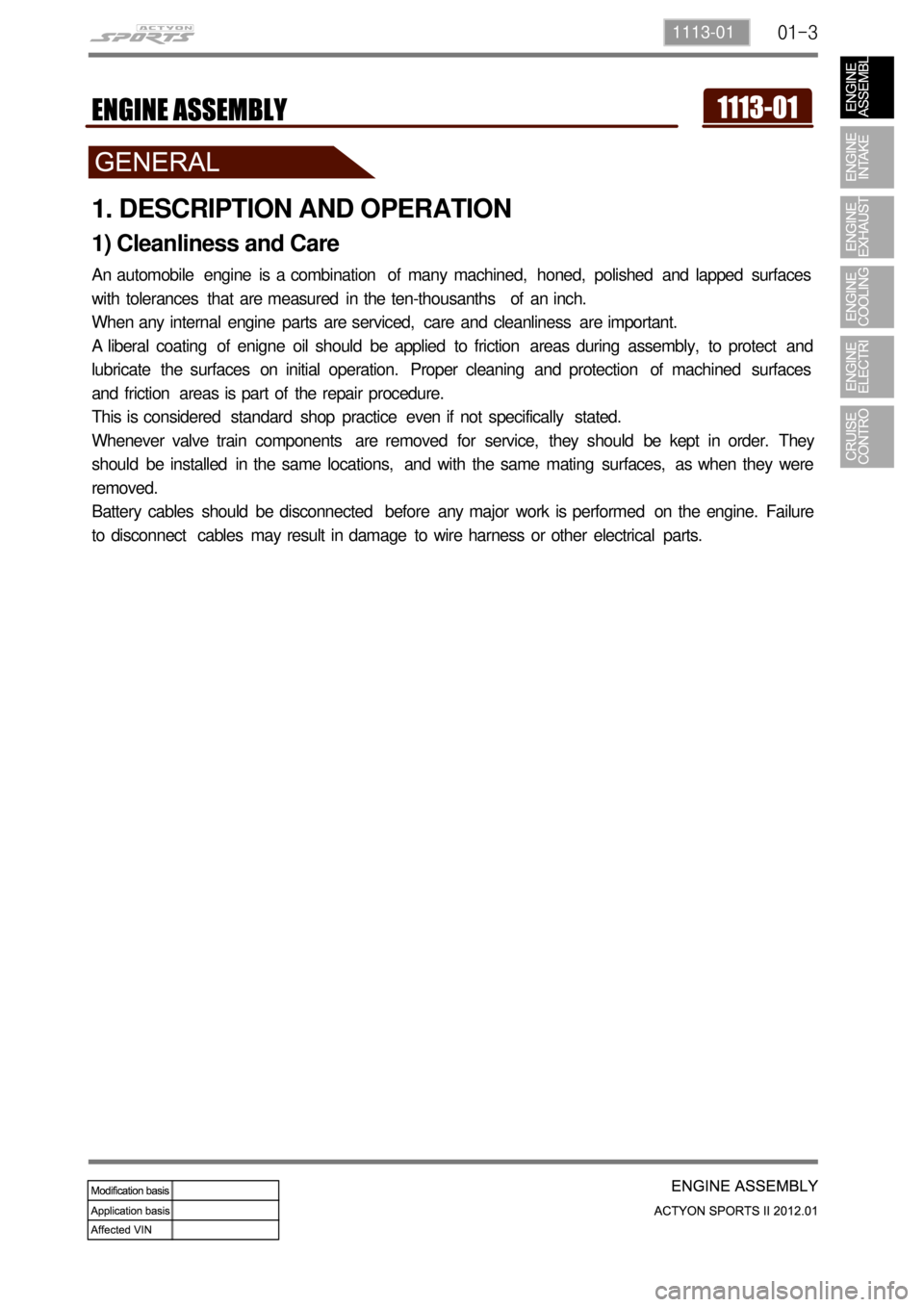Page 346 of 828
15-430000-00
(14) Immobilizer control
A. Overview
The Immobilizer System provides an additional theft deterrent to the vehicle in which it is installed
and prevents it from being started by unauthorized persons. The transponder integrated in the key
and the engine control unit have the same code. When the ignition key with the integrated
transponder is turned to the ON position, the ECU (Engine Control Unit) checks the crypto code
of the key and, if correct, allows the vehicle to start the engine.
For details, refer to Chapter "Immobilizer".
B. Components
Basic components (ignition key system) ▶
D20DTR ECUImmobilizer antennaInstrument cluster
Immobilizer keyStart motor
Page 347 of 828
15-44
Key approval process ▶
When turning the ignition switch to ON position, the power is supplied to BCM and ECU. ECU
communicate with the immobilizer key to check if it is valid crypto code. If it is valid, ECU start to
control the engine when turning the ignition switch to START position. The system has 10
seconds of valid time-out period. If the engine does not start in this period, the key approval
process should be done again.
Page 348 of 828
15-450000-00
(15) CDPF control
A. Overview
As the solution for environmental regulations and PM Particle Material) of diesel engine, the low
emission vehicle is getting popular. This vehicle is equipped with an extra filter to collect the soot
and burn it again so that the amount of PM in the exhaust gas passed through the DOC (Diesel
Oxidation Catalyst) is reduced. The CDPF (Catalyst & Diesel Particulate Filter) is an integrated filter
including DOC (Diesel Oxidation Catalyst) and DPF (Diesel Particulate Filter).
For details, refer to Chapter "CDPF".
B. Components
Oxygen
sensorFront
EGT sensorCDPF
(DOC + DPF)Rear
EGT sensor
Differential pressure
sensorD20DTR ECUElectric throttle body
Page 350 of 828

15-470000-00
Diff. pres. sensor: Measure
pressure between front sid
e
and rear side of CDPF
ECU (DCM 3.7)
Injector: Control post
injection
D. Operation process
When the differential pressure sensor detects the pressure difference between the front and the
rear side of CDPF, the sensor sends signal indicating the soot is accumulated and the post
injection is performed to raise the temperature of exhaust gas. The amount of fuel injected is
determined according to the temperature of exhaust gas detected by the rear temperature sensor.
If the temperature is below 600°C, the amount of fuel injected is increased to raise the
<009b008c00940097008c00990088009b009c0099008c005500470070008d0047009b008f008c0047009b008c00940097008c00990088009b009c0099008c00470090009a00470096009d008c00990047005d0057005700b6006a00530047009b008f008c00
47008800940096009c0095009b00470096008d0047008d009c>el injected is decreased or not
controlled. When the engine is running in low load range, the amount of post injection and the
amount of intake air are controlled. It is to raise the temperature by increasing the amount of fuel
while decreasing the amount of intake air.
Front EGT sensor: Measure
DOC temp.
Rear EGT sensor: Measure
DPF temp.
Electronic throttle body
Control intake air mass
T-MAP sensor
Intake air
mass
Exceed PM
limitBooster
pressure/
temperaturePost injection
Control intake
air mass
Page 351 of 828

15-48
E. Cautions
Use only specified Engine Oil (approved by MB Sheet 229.51) for CDPF. -
Use only specified engine oil (Low Ash Oil) ▶
The vehicle equipped with CDPF should use specific engine oil to improve the engine
performance and fuel economy, and ensure the service life of CDPF. -
Issue with normal engine oil ▶
Sulfur, one of the contents of engine oil is burned and generates soot that is not regenerated
by the DPF. This remains on the filter as ashes and keeps accumulating. Eventually, this
ashes will block the filter. -
Benefit for specified engine oil ▶
Minimized the sulfur content of engine oil which reduces the service life.
Improved fuel economy and emission level of CO2 with high performance and low viscosity.
Increased service life of engine oil with high resistance to temperature. -
-
-
Problems when using unspecified engine oil ▶
The service life of filter may be reduced by 30% or more by the ashes accumulated on the
filter.
The fuel economy may be reduced because of engine rolling resistance, frequent
regeneration of DPF. -
-
These problems are also caused by oil with high sulfur content, such as tax exemption oil
and heating oil, etc. *
Page 353 of 828

01-31113-01
1. DESCRIPTION AND OPERATION
1) Cleanliness and Care
An automobile engine is a combination of many machined, honed, polished and lapped surfaces
with tolerances that are measured in the ten-thousanths of an inch.
When any internal engine parts are serviced, care and cleanliness are important.
A liberal coating of enigne oil should be applied to friction areas during assembly, to protect and
lubricate the surfaces on initial operation. Proper cleaning and protection of machined surfaces
and friction areas is part of the repair procedure.
This is considered standard shop practice even if not specifically stated.
Whenever valve train components are removed for service, they should be kept in order. They
should be installed in the same locations, and with the same mating surfaces, as when they were
removed.
Battery cables should be disconnected before any major work is performed on the engine. Failure
to disconnect cables may result in damage to wire harness or other electrical parts.
Page 354 of 828
01-4
2) On-engine Service
Disconnect the negative battery cable before removing or installing any electrical unit, or
when a tool or equipment could easily come in contact with exposed electrical terminals.
Disconnecting this cable will help prevent personal injury and damage to the vehicle. The
ignition must also be in LOCK unless otherwise noted. -
Any time the air cleaner is removed, the intake opening should be covered. This will protect
against accidental entrance of foreign material, which could follow the intake passage into
the cylinder and cause extensive damage when the engine is started. -
Page 355 of 828
01-51113-01
2. G23D ENGINE ASSEMBLY
Front View
Rear View